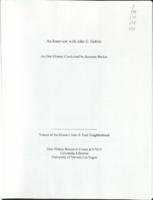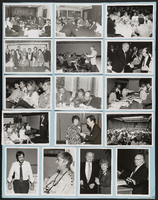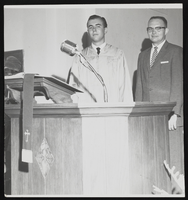Search the Special Collections and Archives Portal
Search Results

Transcript of interview with John G. Gubler by Suzanne Becker, December 29, 2008
Date
Archival Collection
Description
Text

Holocaust Resource Center posters, image 01
Description
Poster consists of photographs featuring various people. The middle photo (third from top) had a piece of paper stuck behind it it with identification of people in photo: "Logan Drola, Edith [Edythe], Deedagv, Teacher Mesquite" (handwriting is difficult to read, names be misspelled). Text printed on back of image reads: "Jews suffered persecution all over Nazi-occupied Europe. Persecutions and impositions on the Jews began immediately following Nazi military occupation of a conquered land in Europe. Their property was confiscated, and they were deprived of their subsistence by being denied the opportunity to work in their professions. They were press-ganged into forced labour, compelled to wear badges of shame. Their honour and that of their religion was dragged in the dust as synagogues were burnt, scared books desecrated, and public prayer banned. Individuals and groups were executed at the slightest pretence."

Photograph of youth worship leaders at church podium, (Nev.), 1940-1960
Date
Archival Collection
Description
Image

Transcript of interview with Laura & Don Garvin by Michael Martocci, March 3, 1979
Date
Archival Collection
Description
On March 3, 1979, Michael Martocci interviewed Laura (born in California) and Don Garvin (born in Goldfield, Nevada) about their lives in Las Vegas, Nevada. The two provide details on their family background, the first sources of water in Las Vegas, and the early city limits. They also describe their early occupations, religion, gambling, the Mormon Fort, and the effects of the Great Depression. The interview concludes with a brief discussion on the development of the Las Vegas Strip and recreational activities.
Text
Lawrence Weekly oral history interview
Identifier
Abstract
Oral history interview with Lawrence Weekly conducted by Elsha Harris Yolanda on November 19, 2014 for the African Americans in Las Vegas: a Collaborative Oral History Project. In this interview, Weekly discusses his personal history and growing up in Las Vegas, Nevada. He talks about the importance of religion in his upbringing and his parent’s employment in the hospitality industry in Las Vegas. Weekly describes the racial discrimination he experienced in education, attending the College of Southern Nevada and later transferring to Grambling State University in Louisiana. Later, Weekly discusses his rationale for attending a historically Black college, his career as a Clark County Commissioner, and the reopening of F Street. Lastly, Weekly talks about the lack of progress in race relations across the United States.
Archival Collection
Morse Arberry oral history interview
Identifier
Abstract
Oral history interview with Morse Arberry conducted by Brittany Thompson and Andrew Thomas on November 20, 2015 for the African Americans in Las Vegas: a Collaborative Oral History Project. In this interview, Arberry discusses his personal history and moving to Las Vegas, Nevada in 1958. He talks about his father's employment at the Nevada Test Site and the issues of segregation at the time. Arberry recalls attending the Westside School and talks about school integration. He then describes his career in legislation, working on bills to improve the integration process, and the impact that the University of Nevada, Las Vegas (UNLV) had on the level of education among adults in the community. Lastly, Arberry discusses the West Las Vegas community, the significance that religion had on African Americans, and the increase of law enforcement in the area.
Archival Collection
Junior Fonotisatele oral history interview
Identifier
Abstract
Oral history interview with Junior Fonotisatele conducted by Cecilia Winchell and Stefani Evans on November 10, 2021 for Reflections: The Las Vegas Asian American and Pacific Islander Oral History Project. Junior discusses his Samoan background and the importance of strong family values. He talks about his early years in Utah and California before moving to Las Vegas where he attended and graduated from the University of Nevada, Las Vegas. Junior shares his employment history as a bodyguard for Floyd Mayweather, an entrepreneur of a clothing brand, and an investor into a range of ventures including security, solar energy, and mental health. He concludes with a discussion of Samoan cultural celebrations, his religion, and the significance of his tattoos.
Archival Collection
Jeanettee L. Del Rosario oral history interview
Identifier
Abstract
Oral history interview with Jeanettee L. Del Rosario conducted by Alessandra Del Rosario on December 6, 2021 for Reflections: The Las Vegas Asian American and Pacific Islander Oral History Project.
Jeanettee Del Rosario talks about her family life with nine siblings and her upbringing in Urdaneta City, Pangasinan province, Philippines. She shares her educational background in hotel and restaurant management and, after immigrating to Las Vegas, Nevada in 2006, the different hotel positions she has held in the city. Jeanettee Del Rosario discusses the process of immigration, language barriers, and missing her family in the Philippines. She also talks about Filipino traditions of respect, barangay fiestas, cultural foods, and religion.
Archival Collection
Irma Varela oral history interviews
Identifier
Abstract
Oral history interviews with Irma Varela conducted by Barbara Tabach on December 04, 2018 and March 05, 2019 for the Latinx Voices of Southern Nevada Oral History Project. In these interviews, Varela talks about her upbringing in Zacatecas, Mexico, her move to Las Vegas, Nevada in 1989, and how religion has affected her life. She also describes her work as the Cultural Program Supervisor at Winchester Community Center, and her career in preserving Hispanic cultural traditions in Las Vegas. Varela talks about being an active leader in local Las Vegas organizations and events such as the Mexico Vivo Dancing Company, Dia de los Muertos (Day of the Dead) celebrations, and the International Food and Folklife Festival.
Archival Collection
Vance "Stretch" Sanders oral history interview
Identifier
Abstract
Oral history interview with Vance "Stretch" Sanders conducted by Camisha Fagan and Micajah Daniels on November 11, 2016 for the African Americans in Las Vegas: a Collaborative Oral History Project. In this interview, Sanders discusses his early life and moving to Las Vegas, Nevada in 2011. He talks about his upbringing in Las Vegas, the influence of organized crime in the city, and the importance of church and religion to him. Sanders then recalls founding the All Shades United organization, with the goal of having people of all colors come together in solidarity to dismantle the institutional and structural barriers that oppress the marginalized. Lastly, Sanders describes the impact that his organization has had on the African American community, the importance of education, and dealing with violence against minority groups.
Archival Collection
